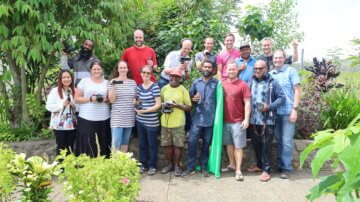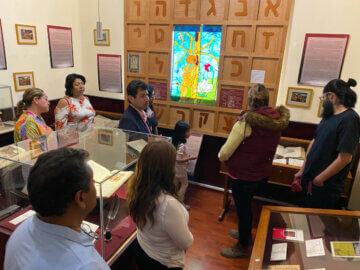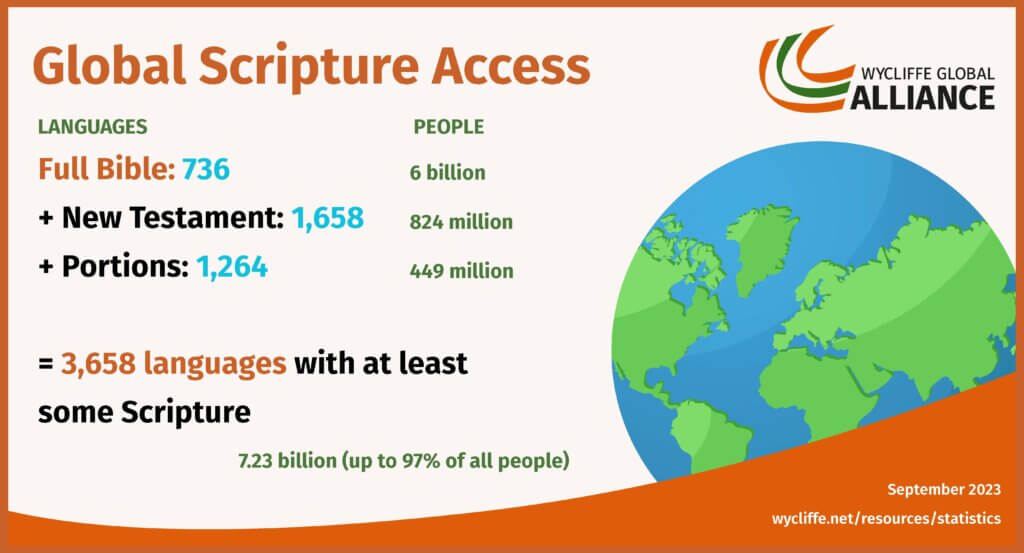Bible translation movement shows big progress
After a predictable slowdown during the first two years of the pandemic, the global Bible translation movement saw major advances in the past year — with Asia and Africa leading the way.
Today, more people speaking more languages have access to more of the Bible than at any time in history, according to ProgressBible. Up to 97.4 percent of all people in the world have access to at least some Scripture, with up to 80 percent having the full Bible and 91 percent having at least the New Testament. These numbers are rising rapidly. In the past year* alone:
- 60 million more people have access to the full Bible in the language they know best.
- 27 million more people have access to the New Testament.
- And, Bible translation work has begun in 356 more languages.
*August 2022 to August 2023

Scripture is being made available in print, digital, audio formats, along with sign languages. These examples are from the Tao people of Orchid Island off the southeast coast of Taiwan. Photo: Marc Ewell, Wycliffe Global Alliance
Terry Dehart, data analyst with ProgressBible, partially attributes the acceleration this year to a rebound from the pandemic years. Another large factor, he adds, is that the collective Every Tribe Every Nation (ETEN) is making a big push with its partners around the world to start Bible translation and then report on progress.
More than half of all languages on earth now have Bible translation work happening—some for the first time and some working toward complete Bibles or undergoing revisions. According to ProgressBible, the world has 7,394 living languages (including hundreds of Deaf sign languages not always reflected in other lists).
This leaves the number of language communities waiting for Bible translation to begin at just 1,268 — 412 fewer than a year ago. In other words, almost 25 percent of the remaining languages listed in 2022 saw projects planned or started in 2023. And, for the first time, the number of people in the world waiting for Bible translation to begin is under 100 million — only about 1.3 percent of all people.
Indonesia, Nigeria and Papua New Guinea each started or have planned projects in 30 or more languages in the past year. Those three countries account for more than half of the global increase in the past year.
Notable for 2023’s snapshot is the acceleration as compared to the worst years of the pandemic, 2020-2022. This chart shows the striking numbers, globally and by region:
Global Scripture Access
Rates of progress, 2023 vs. 2020-22
Shown in numbers of languages

Source: ProgressBible
A maturing movement

In South Africa, people prayed over the audio devices containing translated Sepulana Scriptures before they were distributed to members of that community. Photo: Jennifer Pillinger, Wycliffe South Africa
Dehart says he sees evidence in these statistics that the Bible translation movement is maturing. Where previous generations’ goal often was “missionaries arrive, work, complete the New Testament and move on", today a much larger vision has taken shape — completing the whole Bible, updating and revising dated translation, often with language communities and local churches taking on more of the task themselves—along with helping their communities continually engage with the translated Scripture.
“It's much more of an ongoing task than a single event,” Dehart says. “Seeing hundreds of languages with a Bible or New Testament and an ongoing project suggests that we are pushing past what was the initial goal and are trying to sustain a recent, full translation of the Bible over the long haul.”
Stephen Coertze, executive director of the Wycliffe Global Alliance, affirmed the importance of Scripture Access statistics as one way to measure progress in worldwide Bible translation.
“But the real stories are found in changed lives and communities as people encounter God through his Word, and as the worldwide church moves toward greater unity in Christ,” Coertze said. “For us as an Alliance, our overarching vision remains our desire to see every individual, community and nation transformed through God’s love and Word expressed in their language and culture.”
“Though we continue to celebrate translation starts and work in progress, we continue to work toward full Scripture translation for each language community, adequate revisions, and Scripture in the format (written, oral, signed) that each language community needs,” he added. “To see our desired vision fulfilled, we will continue to relate with the church and other partners as we collectively journey to see each person to have the ability to interact with God through his Word.”
The Wycliffe Global Alliance presents Global Scripture Access Statistics annually from data provided through ProgressBible by Alliance organisations, SIL International, United Bible Societies and many other partners. Data is current as of 1 September 2023. Our full report— including informational graphics, data on world population and number of languages, and explanations of terminology—is available here.
•••
Story: Jim Killam, Gwen Davies
Alliance organisations may download and use the images from this article.
The latest
View all articles
03/2024 Pacific: Papua New Guinea
Informing, teaching, inspiring: PNG workshop teaches video storytelling for language communities
PNG workshop teaches video storytelling for language communities
Read more
02/2024 Global
Looking ahead at 2024
As the year unfolds, we marvel at the work of God in our rapidly changing world. And, we look forward to a number of gatherings and conversations intended to draw us together.
Read more
01/2024 Americas
Telling the Bible's Story
It may come as a surprise that a museum is among the Wycliffe Global Alliance organisations.
Read more
